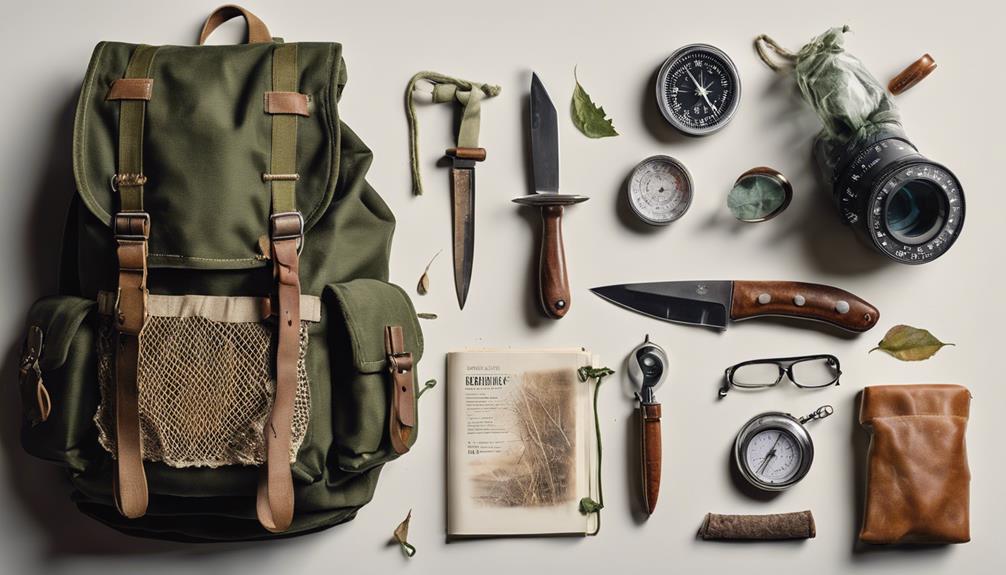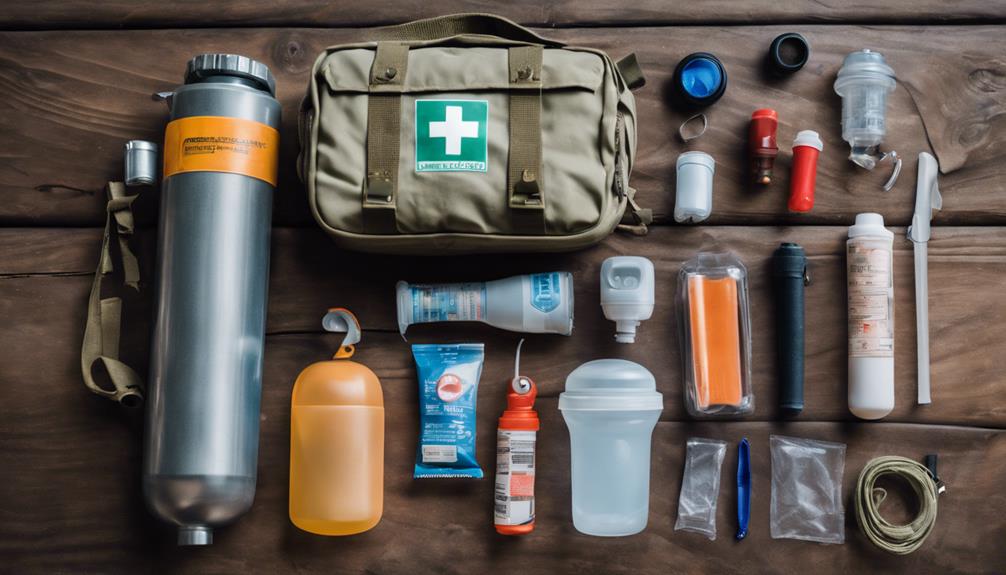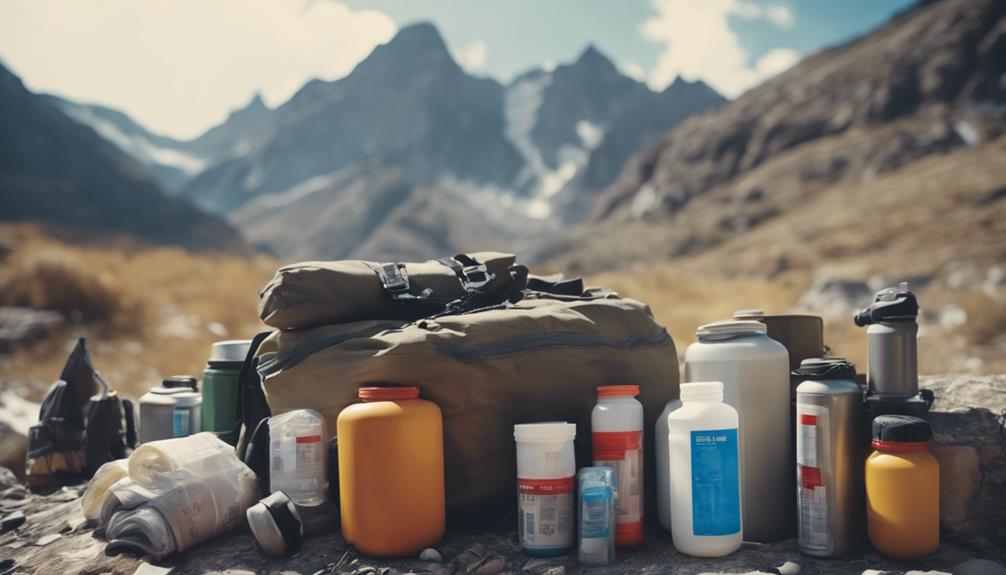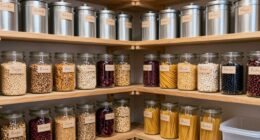As a nature enthusiast, essential foraging tools include the Mushroom Knife with Foraging Bag Kit for precise cutting and collection. The Nisaku NJP650 Hori Hori Weeding Knife offers durable stainless steel and inch markings for depth. The Professional Hori Hori Gardening Knife guarantees durability with full-tang 8CR steel. Seek the convenience of the Foraging Bag Waxed Canvas Pouch for portability. Don't forget the Miyake Folding Garden Pocket Knife Tool for versatility. Explore tools like the Wrenbury Mushroom Knife for a comfortable grip. These tools, each offering unique benefits, can enhance your foraging experience in nature.
Key Takeaways
- Versatile tools suitable for hunting, camping, and gardening activities.
- Ergonomic designs for comfort and efficiency during prolonged use.
- Lightweight and portable options for easy carrying on outdoor excursions.
- Tools with additional features like brushes and tweezers for multi-functional use.
- Compact folding designs with convenient storage solutions for on-the-go convenience.
Mushroom Knife with Brush and Foraging Bag Kit

For avid nature enthusiasts who enjoy mushroom hunting, the Mushroom Knife with Brush and Foraging Bag Kit offers a convenient and practical toolset. This kit includes a folding gardening knife made of stainless steel, featuring a sharp blade for precise cutting.
The green foraging bag provides ample space to collect various mushrooms while out in the wilderness. Customers have praised the knife's sturdiness and sharpness, making it ideal for foraging activities. Some feedback suggests improvements could be made to the bag's closure mechanism and the carabiner's durability.
Overall, this kit has garnered positive reviews for its functionality and usefulness in outdoor activities like gardening, camping, and foraging. With its lightweight design and compact size, it's a handy companion for any nature lover venturing into the wild.
Best For: Outdoor enthusiasts and mushroom hunters looking for a compact and reliable toolset for foraging activities.
Pros:
- Sturdy stainless steel blade for precise cutting
- Convenient folding design for portability
- Includes a foraging bag for collecting mushrooms
Cons:
- Some feedback on the quality of additional components like the bag closure
- Suggestions for improvements on the durability of the carabiner
- Limited warranty information provided
Nisaku NJP650 The Original Hori Hori Namibagata Japanese Stainless Steel Weeding Knife

Ideal for nature enthusiasts seeking a versatile tool for gardening, the Nisaku NJP650 The Original Hori Hori Namibagata Japanese Stainless Steel Weeding Knife is a top choice. Made in Japan with premium stainless steel, this tool boasts inch markings on the blade for accurate planting depths and features both serrated and straight edge blades. Its rust and scratch-resistant properties, along with a razor-sharp blade, guarantee durability and efficiency.
With a 7.25-inch blade and ergonomic wood handle, it offers comfort and control. Weighing 10 oz., this multi-use knife is suitable for gardening, landscaping, and camping. Users praise its performance in planting, weeding, and root cutting tasks, showcasing its versatility and durability. The Nisaku NJP650 is a reliable and long-lasting companion for various gardening needs.
Best For: Gardeners and outdoor enthusiasts looking for a versatile and durable tool for various gardening tasks.
Pros:
- Made with premium stainless steel for durability and rust resistance.
- Features inch markings on the blade for precise planting depths.
- Ergonomic wood handle provides comfort and control during use.
Cons:
- Some users have commented on the design and functionality of the sheath.
- May require extra care due to the razor-sharp blade.
- Limited warranty period of 2 years.
Professional Hori Hori Gardening Knife Full-Tang 8CR Soil Knife

The Professional Hori Hori Gardening Knife Full-Tang 8CR Soil Knife is a versatile and durable tool designed for outdoor tasks. It features a weeding fork top and serrated sides, making it ideal for scooping, digging, and weeding. Constructed with heat-tempered 8CR stainless steel and a walnut wood handle coated in Danish oil, this tool ensures durability against moisture and dirt.
The included 1680D polyester sheath protects the blade and helps maintain its sharpness. The knife also comes with a comfortable handle, stainless steel belt clip, and handle strap for easy carrying, accessibility, and safety during use. Users have praised this gardening knife for its functionality and quality, emphasizing its craftsmanship, durability, and performance.
Best For: Nature enthusiasts and avid gardeners looking for a versatile and durable gardening tool for tasks like scooping, digging, and weeding.
Pros:
- Crafted with heat-tempered 8CR stainless steel for durability.
- Comfortable walnut wood handle coated in Danish oil for moisture resistance.
- Includes a 1680D polyester sheath for blade protection and maintenance.
Cons:
- May be on the heavier side at 12.7 ounces.
- Limited color options with only the Stone Wash available.
- Pricing may be higher compared to similar gardening knives.
Foraging Bag Waxed Canvas Outdoor Camping Foraging Pouch

Crafted from water-resistant canvas and retro style polyurethane leather, the Foraging Bag Waxed Canvas Outdoor Camping Foraging Pouch by TIEFUMYO offers nature enthusiasts a versatile and durable option for their outdoor adventures.
This pouch, measuring 9.8' in height and 8.26' in width, features two front pockets and is foldable for convenience. It can be attached to a belt or used as a shoulder bag, making it adaptable for various activities like camping, hiking, bushcraft, and beachcombing.
The vintage brown color adds a touch of style to its functionality. With a drawstring closure and a weight of 0.21 kilograms, this pouch provides ample space with three pockets for storage.
TIEFUMYO's Foraging Bag has received positive feedback for its size and versatility, making it a practical choice for those who enjoy outdoor adventures and collecting treasures.
Best For: Nature enthusiasts and outdoor adventurers seeking a versatile and durable foraging pouch for their activities.
Pros:
- Water-resistant canvas and retro style polyurethane leather for durability.
- Multiple wearing methods for added convenience.
- Compact size with ample storage space.
Cons:
- Limited color options available.
- Drawstring closure may not be as secure as a zipper.
- May not fit bulky items due to the compact size.
Miyake Folding Garden Pocket Knife Multi Tool

For nature enthusiasts seeking a versatile tool for harvesting produce and exploring the outdoors, the Miyake Folding Garden Pocket Knife Multi Tool offers a convenient solution. This lightweight and foldable knife, with an oak wood handle, is designed for tasks like cutting fruits, vegetables, and mushrooms.
Its special features include tweezers, a ruler, and a brush, making it ideal for gardening, camping, and outdoor activities. With a safety lock, comfortable grip, and a keychain for portability, this knife is suitable for adults, teens, and kids.
The Miyake Knife isn't only reusable but also a great gift idea for gardeners, campers, and outdoor enthusiasts, combining functionality, style, and convenience in one compact tool.
Best For: Gardeners, campers, and outdoor enthusiasts looking for a versatile tool for harvesting produce and exploring the outdoors.
Pros:
- Lightweight and foldable for easy portability.
- Multi-tool design with tweezers, ruler, and brush for various tasks.
- Comfortable grip and safety lock for secure use.
Cons:
- Hand wash only care instructions may be inconvenient for some users.
- Limited color options available.
- May not be suitable for heavy-duty tasks requiring larger tools.
Mushroom Foraging Kit with Hunting Bag, Brush, Guide Cards, and Notebook

Perfect for enthusiastic mushroom hunters, this all-inclusive foraging kit includes a mesh bag, stainless steel knife, guide cards, and a notebook. The stainless steel knife guarantees durability, while the mesh bag protects delicate mushrooms from damage during foraging trips.
The guide cards offer valuable information for identifying different mushroom species, making this kit ideal for those looking to expand their knowledge of fungi. Additionally, the notebook allows for jotting down observations or recording locations of mushroom finds.
While some customers have noted concerns about the quality of certain components, the majority found this kit to be a useful companion for outdoor activities like hiking and camping. With its compact size and essential tools, this mushroom foraging kit is a practical choice for nature enthusiasts venturing into the world of mycology.
Best For: Outdoor enthusiasts and nature lovers seeking a comprehensive mushroom foraging kit for their hiking and camping adventures.
Pros:
- Durable stainless steel knife for efficient mushroom harvesting.
- Mesh bag protects delicate mushrooms from damage.
- Guide cards and notebook aid in mushroom identification and recording findings.
Cons:
- Some customers reported concerns about the quality of certain components.
- May not be suitable for all foraging needs due to the kit's limited scope.
- Potential issues with completeness of the kit for advanced mushroom hunters.
Mushroom Foraging Kit with Foraging Bag, Mushroom Knife, Brush, and Waterproof Journal

Ideal for nature enthusiasts who enjoy mushroom hunting and foraging adventures, the Mushroom Foraging Kit provides essential tools such as a foraging bag, mushroom knife, brush, and waterproof journal.
The kit, designed by Gather Americana in the USA, features a foldable waxed canvas bag that's lightweight and waterproof, making it ideal for outdoor activities. The high carbon stainless steel blade of the mushroom knife, with a 3-inch hawkbill shape and V-Grind serrations, guarantees durability and sharpness for harvesting mushrooms. The walnut wood handle adds a touch of elegance to the knife.
Additionally, the waterproof field notebook included in the kit allows for convenient jotting down of notes and observations during foraging expeditions. With positive customer reviews praising its quality and functionality, this Mushroom Foraging Kit is a must-have for any foraging enthusiast.
Best For: Outdoor enthusiasts and nature lovers who enjoy mushroom hunting, foraging, camping, and hiking adventures.
Pros:
- Durable and sharp mushroom knife for effective harvesting.
- Lightweight and waterproof foraging bag for convenience.
- Waterproof field notebook for easy note-taking during outdoor expeditions.
Cons:
- Lacks a guidebook for mushroom identification.
- Limited color or design options for the kit.
- Price may be on the higher end for some budget-conscious buyers.
Mushroom Foraging Kit with Bag, Knife, and Brush

Designed for avid mushroom hunters, the Mushroom Foraging Kit with Bag, Knife, and Brush by Eorbow provides essential tools for harvesting and preserving mushrooms in the wild.
The kit includes a mesh harvesting pouch bag measuring 15 x 16 inches, a folding mushroom knife that spreads to 6.7 inches, and a brush. The durable bag is tear-resistant, while the mesh pouch keeps mushrooms fresh by allowing them to breathe.
With an adjustable shoulder strap, this kit is convenient for outdoor activities like hiking, camping, and hunting. The compact design of the knife guarantees safety during transportation.
This Eorbow kit, with a package weight of 0.19 kilograms, is a practical companion for mushroom foragers seeking a reliable and functional toolset.
Best For: Outdoor enthusiasts and mushroom foragers looking for a convenient and durable toolset for harvesting mushrooms in the wild.
Pros:
- Includes a mesh harvesting pouch bag for keeping mushrooms fresh.
- Adjustable shoulder strap for easy carrying during outdoor activities.
- Compact folding knife design ensures safety during transportation.
Cons:
- Limited color options available.
- Brush may not be as durable as expected.
- Knife size may be small for some users.
SHALL Hori Hori Garden Knife with Leather Sheath

The SHALL Hori Hori Garden Knife with Leather Sheath offers nature enthusiasts a versatile and durable tool for various gardening tasks. This knife features a 7-inch stainless steel blade with a non-slip rosewood handle, providing a secure grip for precision cutting and digging.
The full-tang construction and protective handguard guarantee both sturdiness and safety during use. Additionally, the leather sheath with a hide rope offers convenient storage and portability.
With its exquisite workmanship and ergonomic design, this knife is praised for its functionality in tasks like planting, weeding, and harvesting. Whether you're a seasoned gardener or a beginner, the SHALL Hori Hori Garden Knife is a reliable companion for your outdoor endeavors.
Best For: Gardening enthusiasts looking for a versatile and durable tool for precision cutting, digging, planting, weeding, and harvesting in their outdoor activities.
Pros:
- Exquisite workmanship and durable construction
- Non-slip rosewood handle for a secure grip
- Multi-functional blade suitable for various gardening tasks
Cons:
- Hand wash only, not dishwasher safe
- Leather sheath might require regular maintenance to prevent wear
- Blade length may be too short for certain tasks
Mushroom Foraging Bag for Outdoors

This mushroom foraging bag is a practical companion for avid nature enthusiasts seeking a lightweight and durable solution for collecting mushrooms outdoors. The bag, designed in a convenient collapsible mesh style, not only makes it easy to gather mushrooms but also allows mushroom spores to escape for regrowth.
Made from sturdy yet lightweight material, it includes straps for added durability during long foraging trips. With ample space and an easy-to-clean design that prevents mushrooms from rattling, this TOYMIS mushroom foraging bag is an ideal gift for mushroom foraging enthusiasts.
Customers have praised its size and functionality, making it a well-received tool for outdoor adventures.
Best For: Outdoor enthusiasts and mushroom foraging enthusiasts seeking a lightweight and durable solution for collecting mushrooms.
Pros:
- Convenient collapsible mesh design for easy mushroom collection.
- Allows mushroom spores to escape for regrowth.
- Sturdy and lightweight material with straps for durability.
Cons:
- Some users find the product slightly overpriced.
- Potential errors in size and weight due to manual measurement.
- Possible slight color differences due to monitor variations.
Mushroom Foraging Knife with Boar-Bristle Brush and Walnut Handle

Ideal for mushroom enthusiasts and foragers, the Mushroom Foraging Knife with Boar-Bristle Brush and Walnut Handle offers a versatile and durable tool for various foraging activities. This knife features a 3-inch high carbon steel blade with a double-edge curved design for precise cuts.
The boar-bristle brush attached to the knife's back allows for easy cleaning of harvested mushrooms. Its water-resistant walnut handle provides a comfortable grip, making it suitable for extended use in outdoor settings.
This rust-resistant tool isn't only ideal for mushroom hunting but also for gathering wild berries, herbs, and nuts. With positive customer reviews praising its quality and functionality, this knife is a valuable addition to any forager's toolkit.
Best For: Outdoor enthusiasts and foragers looking for a versatile and durable tool for mushroom hunting and various foraging activities.
Pros:
- High carbon steel blade for precise cuts
- Boar-bristle brush for easy cleaning
- Water-resistant walnut handle for comfortable grip
Cons:
- Some reports of broken knives and missing parts
- May not be suitable for heavy-duty cutting tasks
- Higher price point compared to similar products
Jutom Mushroom Foraging Set

For avid mushroom hunters seeking a durable and convenient foraging set, the Jutom Mushroom Foraging Bag and Knife Set offers a practical solution with its adjustable shoulder strap and folding knife design.
This set includes a brown mushroom collecting bag measuring 15 x 17 inches, suitable for storing various foraged items. The 6.7-inch mushroom knife features a dimension scale for measuring mushrooms and is designed for safety and convenience with its folding mechanism.
Made of durable materials like canvas, mesh, stainless steel, and wood handle, this set aims to keep mushrooms fresh and intact during your foraging adventures.
Suitable for outdoor activities like hiking, camping, hunting, and picnics, the Jutom Mushroom Foraging Set provides a reliable companion for your mushroom hunting escapades.
Best For: Outdoor enthusiasts and mushroom hunters looking for a durable and practical foraging set for collecting mushrooms during outdoor activities.
Pros:
- Adjustable shoulder strap for easy carrying during picking activities.
- Durable materials like canvas, mesh, stainless steel, and wood handle to keep mushrooms fresh.
- Folding knife design for safety and convenience during mushroom hunting.
Cons:
- Some users may find the price slightly higher compared to similar mushroom foraging sets.
- Limited color options, as the set is only available in brown.
- The bag size may be too small for those looking to collect a large quantity of mushrooms at once.
Foraging Bag Waxed Canvas Collapsible Outdoor Camping Pouch, Brown

With its durable waxed canvas construction and versatile usage scenarios, the foraging bag by ASENIE is a practical choice for nature enthusiasts looking to collect various items while camping or hiking.
This collapsible pouch, made of PU leather and waxed canvas, boasts a compact folded size of 3.5×4 inches, expanding to a generous 9×8.5 inches when unfolded. It can hold up to 2 pounds of foraged treasures, secured by an easy buckle closure and drawstring. The bag's brown color adds a touch of style to its functionality.
Ideal for collecting shells, mushrooms, flowers, seeds, fruits, and vegetables, it can also serve as a rock climbing bag, tool holder, or golf tee pouch. Whether feeding wildlife or gathering natural finds, this foraging bag offers convenience and durability for outdoor adventures.
Best For: Nature enthusiasts who enjoy camping, hiking, foraging, and collecting various natural items.
Pros:
- Durable waxed canvas construction
- Versatile usage scenarios for outdoor activities
- Compact yet expands to hold up to 2 pounds of items securely
Cons:
- Some concerns about size and quality in comparison to images
- Mixed reviews on weight capacity and size
- Potential disappointment in quality compared to expectations
Foraging Bag with Knife, Mushroom Bag – Mushroom Hunting Kit

Featuring a mesh material that allows mushroom spores to escape, the foraging bag with attached pouch and mushroom knife in the Mushroom Hunting Kit is a practical choice for nature enthusiasts seeking a lightweight and durable solution for their foraging expeditions.
This Olive Green bag by VylerSky is made of polyester, offering a spacious design ideal for mushroom hunting and other outdoor activities. Customers have praised its size, quality, and easy cleaning, making it a valuable addition to any forager's gear.
While some feedback mentioned the knife's heaviness and opening/closing difficulty, overall satisfaction and value for money were highlighted. With a 1-year warranty and positive customer reviews, this Mushroom Hunting Kit stands out as a reliable and functional tool for both seasoned foragers and beginners.
Best For: Outdoor enthusiasts and mushroom foragers looking for a lightweight and durable solution for their foraging expeditions.
Pros:
- Spacious design ideal for mushroom hunting and outdoor activities
- Mesh material allows mushroom spores to escape
- Easy to clean and maintain
Cons:
- Some users found the knife to be heavy
- Opening and closing the knife may be challenging for some
- Limited color options available
Wrenbury Mushroom Knife with Brush Folding

Nature enthusiasts seeking a durable and compact knife for mushroom foraging adventures will appreciate the Wrenbury Mushroom Knife with Brush Folding. This versatile tool features a 3' stainless steel blade with a curved shape, perfect for harvesting mushrooms.
The knife's folding design and included black sheath make it easy to carry around during outdoor expeditions. The wooden handle adds a touch of elegance while ensuring a comfortable grip.
With its lightweight construction and locking blades, the Wrenbury Mushroom Knife is a reliable companion for any foraging enthusiast. Despite some reports of the brush not fitting properly, the overall positive customer reviews highlight the knife's value, quality, and usefulness in the field.
This knife isn't just a practical tool but also a thoughtful gift for mushroom lovers.
Best For: Outdoor enthusiasts and mushroom foraging enthusiasts looking for a durable and compact knife for harvesting mushrooms.
Pros:
- Lightweight and compact design for easy portability during outdoor expeditions.
- Sturdy stainless steel blade with a curved shape ideal for mushroom foraging.
- Versatile tool with locking blades and folding feature for convenience.
Cons:
- Some reports of the brush not fitting properly.
- Limited color options available.
- May not be suitable for heavy-duty tasks beyond mushroom foraging.
Factors to Consider When Choosing Tools for Foraging

When selecting tools for foraging, it's essential to take into account their:
- Versatility
- Material
- Ergonomic design
- Portability
- Storage options
These factors can significantly influence the efficiency and enjoyment of your foraging experience. By attentively evaluating these aspects, you can guarantee you have the right tools to make the most of your nature exploration.
Essential Foraging Tools
Considering durability and practicality is essential when selecting essential foraging tools for outdoor activities. A reliable knife is important for cutting through various plants and mushrooms, while a sturdy bag allows for easy collection of foraged items. Additionally, a brush specifically designed for cleaning mushrooms can help guarantee food safety and preparation efficiency.
When choosing these tools, it's important to pay attention to the material and construction to secure longevity during outdoor foraging expeditions. Features like folding designs, ergonomic handles, and rust-resistant blades can enhance convenience and functionality.
Furthermore, considering the size and weight of the tools is crucial for portability and comfortable use in different foraging environments. Opting for multi-functional tools that can perform various tasks such as cutting, cleaning, and carrying items can greatly improve the efficiency of your foraging experience.
Tool Material Considerations
Foraging tools' material plays a crucial role in their performance and longevity during outdoor activities. When selecting tools for foraging, it's important to take into account the durability and rust-resistance of the material.
Stainless steel blades are ideal for maintaining sharpness and ensuring easy maintenance in the field. Additionally, opt for tools with wood or ergonomic handles to enhance grip and control while foraging. Lightweight materials can help reduce fatigue when carrying and using the tools for extended periods.
Furthermore, choosing materials that are easy to clean and maintain will contribute to efficient use during foraging activities. By prioritizing these material considerations, nature enthusiasts can make sure that their foraging tools aren't only effective but also durable and comfortable to use in various outdoor settings.
Versatility in Tools
Exploring the versatility of tools for foraging enhances outdoor experiences with practicality and efficiency. When selecting tools for foraging, considering their versatility is essential. The best tools for foraging are those that can serve multiple purposes, such as cutting, digging, and gathering items efficiently. A well-designed tool not only minimizes the gear you need to carry but also maximizes the variety of wild foods you can collect in different environments. Ultimately, the right selection of versatile tools can significantly improve the overall success and enjoyment of your foraging expedition.
Opting for multi-functional tools that can be used in various outdoor activities like hunting, camping, and gardening adds value to your foraging adventures. Tools with additional features such as knives with brushes, tweezers, rulers, and sheaths not only enrich the foraging experience but also make tasks like harvesting, cleaning, and transporting foraged items more efficient.
Look for tools that offer flexibility in usage, such as foldable designs, adjustable straps, and lightweight materials for easy carrying during foraging trips. Versatile tools not only enhance convenience but also provide durability and functionality across different tasks and environments, contributing to a more enjoyable foraging experience.
Ergonomic Design Importance
When selecting tools for foraging, one must prioritize ergonomic design to guarantee comfort and efficiency during prolonged use. Proper ergonomics play an important role in reducing strain and fatigue, enhancing comfort, grip, and control while foraging.
Tools with well-thought-out ergonomic features can prevent hand and wrist injuries, making the foraging experience more enjoyable and efficient. It's essential to take into account factors like handle shape, size, and material to ensure ergonomic suitability for different hand sizes and preferences.
Portability and Storage
Consider the portability of foraging tools by prioritizing compact folding designs, lightweight materials, and convenient storage solutions. Opt for tools that offer easy-to-carry options like belt loops or shoulder straps for hands-free movement.
Look for tools with attached pouches, sheaths, or compartments to keep additional accessories organized and accessible. Tools with collapsible features or foldable designs allow for compact storage when not in use, making them easy to transport without adding unnecessary bulk.
Evaluate the durability of storage components to make sure they can withstand outdoor conditions and effectively protect your tools. Prioritize efficient storage options that provide quick access to accessories like brushes, sharpeners, or notepads, enhancing your foraging experiences.
Durability for Longevity
To guarantee the longevity of your foraging tools, prioritize selecting items crafted from durable materials like stainless steel or high carbon steel. These materials are known for their strength and resilience, making them ideal for enduring the rigors of outdoor foraging activities.
Additionally, check for tools with rust-resistant coatings or treatments to make certain they can withstand exposure to moisture and outdoor conditions without corroding.
When considering durability for longevity in foraging tools, it's also essential to look for sturdy handles. Opt for tools with handles made of wood or featuring ergonomic designs to provide a comfortable and secure grip while out in the field.
Moreover, choosing tools with folding or sheathed designs can help protect the blade when not in use, ensuring safe storage and convenient transportation.
Frequently Asked Questions
Can These Foraging Tools Be Used for Other Outdoor Activities?
Yes, these foraging tools can be versatile for various outdoor activities. They aid in identifying edible plants, exploring terrain, and even setting up camp. Their functionality extends beyond foraging, making them valuable for outdoor enthusiasts.
How Should I Clean and Maintain the Mushroom Knife With Brush?
To clean and maintain the mushroom knife with a brush, I usually rinse it with warm, soapy water and use the brush to scrub off any debris. Then, I dry it thoroughly to prevent rust.
Are There Any Safety Precautions to Keep in Mind While Foraging?
When foraging, always wear gloves to protect against thorns or toxic plants. Stay aware of your surroundings, watch for wildlife, and carry a first aid kit. Research plants thoroughly before consumption to avoid poisoning.
Can the Foraging Bag Hold a Significant Amount of Weight?
Absolutely, the foraging bag can hold a significant amount of weight. It's sturdy and spacious, making it perfect for carrying all the treasures found during nature expeditions. I highly recommend it.
Are There Any Specific Tips for Using the Hori Hori Gardening Knife Effectively?
When using the hori hori gardening knife effectively, I recommend maintaining a sharp edge for clean cuts, using the serrated edge for tougher materials, and cleaning and oiling it regularly to prevent rust.
Conclusion
To sum up, having the right tools for foraging can make all the difference in your outdoor adventures.
Just like a skilled artist needs quality brushes to create a masterpiece, a nature enthusiast needs reliable tools to navigate the wilderness.
So, equip yourself with the best gear and get ready to explore the great outdoors like never before!










